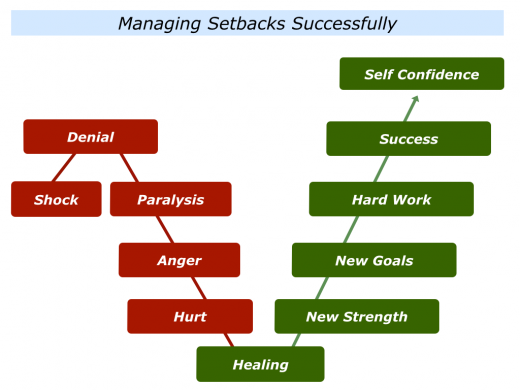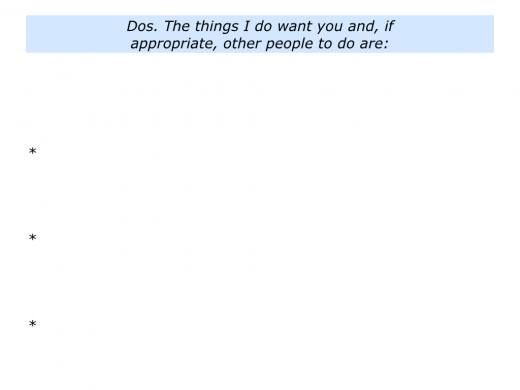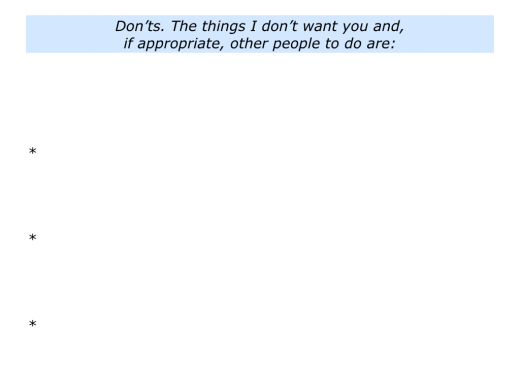Imagine you are mentoring a person who is unsure about how to behave towards somebody who is experiencing difficulties. They may not know what to do in a situation where either:
A person is experiencing an illness;
A person is experiencing depression;
A person is returning to work after a personal tragedy.
Certainly they want to show caring, but sometimes it can be difficult to know how to behave. One approach is to invite the person they care for to describe what they do and do not want others to do in the situation. Let’s explore how this can work in action.
Several years ago I was counselling a person who had lost her husband in traumatic circumstances. One month after her loss she decided to return to her work in a small technology company.
Still grieving from the tragedy, she wanted to feel more in control. Returning to work would help her to follow a predictable rhythm and regain a sense of success. She recognised, however, that people might not know how to behave when she returned.
This was confirmed when the CEO of the company called me. He asked for guidance about how people should behave. Should they treat her in particular way, ask how she was doing or not mention the tragedy?
The last thing she wanted were lots of personal therapy sessions over coffee. So how should people behave when she returned to work?
The key in such situations is that the person who is being ‘cared for’ should feel in control. Bearing this in mind, I asked her to describe the Dos and Don’ts regarding how people should treat her at work.
After some reflection she produced the following list. This was shared with the forty people in the company two days before she returned to work. Here is what she produced.
Dos
Do treat me normally and, if appropriate, involve me in your professional projects.
Do use my skills on the work you are doing for customers.
Do invite me to some of your social events, though I may not come to all of them.
Do be yourselves – laugh, joke and enjoy life.
Do respect my privacy and the fact that it will take time for me to recover.
Don’ts
Don’t be shocked by my appearance, because I have lost a lot of weight.
Don’t ask about my feelings, because it will take time to deal with what has happened.
Don’t ask how my family is dealing with my husband’s death, because this is something we are working on privately.
The return to work went well. She continued to experience challenges, but she found it helpful to follow a set routine and enjoy feelings of success. Six months later the pain still remained, but she felt more able to shape her future life.
Making clear contracts with people
who are going through challenging times
Sometimes it can be hard to know how to help others who are going through tough times. One person said:
“I am not sure how to help my partner who has recently had an illness. The physical problems have eased, but now he falls into deep depressions.
“Some days he feels good, but other days he finds it difficult to get out of bed. I want to help, but sometimes it feels like I am doing the wrong thing.”
People who want to help others can sometimes feel helpless. It is then important to clarify what they can and can’t do for the other person.
They can provide physical and psychological support, but they can’t fix everything for the one they love. The other person may also need to focus on what they can control in the particular situation.
People who experience difficulties sometimes go through the classic reactive change curve. One point to bear in mind about this curve, however, is that is was described by Elisabeth Kübler-Ross in her study of people who knew they were going to die.
Other research has shown that people may have different kinds of experiences when experiencing grief or setbacks.
Imagine, however, that a person experience the stage of shock, denial, paralysis, anger and hurt. Spending time in their chosen sanctuary, they may then begin the process of healing. Gathering strength, they may set new goals, work hard, achieve success and gain self-confidence.
The process is not linear, of course, and there may be many ups and downs on the journey. Sometimes a person may feel they are back on the road to recovery, only to have flashbacks and return to experiencing the pain.
Over the years, however, many people put the bad experience into perspective. They feel older, wiser and stronger
How do people come through the curve? They may manage it by themselves, talk with a friend, join a self-help group or use another approach.
Depending on the approach they use, people may spend time in a sanctuary. They then take charge of shaping their future and getting a success. Let’s explore this process.
People who suffer a setback often need to lick their wounds and begin to make sense of the experience. Different people choose different kinds of sanctuaries. They may rest, sleep, write, listen to music, see a counsellor or whatever. People begin to heal and regain their strength.
Sanctuaries are great. But there comes a time to move on, otherwise the muscles atrophy. People focus on what they can control and start shaping their future.
They set short-term goals, work hard and get a success. Feeling more confident, they take the next step in their life or work.

Let’s return to the person mentioned earlier who wanted to help their partner who had overcome the physical aspects of an illness. How could they help them to deal with any psychological aspects?
Their partner had read about many aspects of dealing with depression. They had also joined a self-help group and followed its suggested guidelines for taking charge of their life. These included:
To follow a structured routine, such as getting up at the same time every day, even if they felt like staying under the covers;
To eat healthy food and do the kinds of exercise they enjoyed, such as running;
To spend time with positive people and do things that gave them positive energy;
To do satisfying projects that gave them a sense of purpose and success;
To keep a gratitude journal and also focus on how they could use their experience to help other people.
As mentioned earlier, the person wanted to support their partner during this time. After exploring different routes, they decided to make a clear contract regarding what their partner did and did not want them to do.
The person planned ahead and chose the right time to have such a conversation. When the time came, they said something along the following lines to their partner.
“As you know, I want to stay with you for the rest of our lives. We have such good times and I want to keep encouraging you.
“Looking ahead, I would like some guidance about how I can best support you over the next few months. Sometimes I try to help, but I am not sure if I am doing the right thing.
“Bearing this in mind, it would be helpful if you can let me know two things. First, the things you do want to me do to help you during this time. Second, the things you don’t want me to do.
“I am not looking for you to respond straight away. But it would be good to get some ideas once you have had chance to reflect.
“Building on your ideas, I will then try to do my best to keep encouraging you and building our relationship.”
The person’s partner wondered where this approach had come from, but then began to reflect. Three days later this resulted in them sharing their ideas over dinner. The conversation helped to clear the air and laid the foundations for building an even better relationship.
Clear contracting is crucial in any relationship. This is particularly so when people are going through difficult times. Such an approach sounds challenging. But it is even more challenging not knowing how people want you to behave towards them in a relationship.
Imagine you want to apply this approach. If you wish, you can invite the other person to describe the Dos and Don’ts regarding how they want you to behave towards them. It is then up to you to decide if you would like to follow these guidelines.
Below is a framework you can use. You will need to feel comfortable taking this step and doing it in your own way. When done properly, however, it can help people to continue to build fulfilling relationships.











Leave a Reply